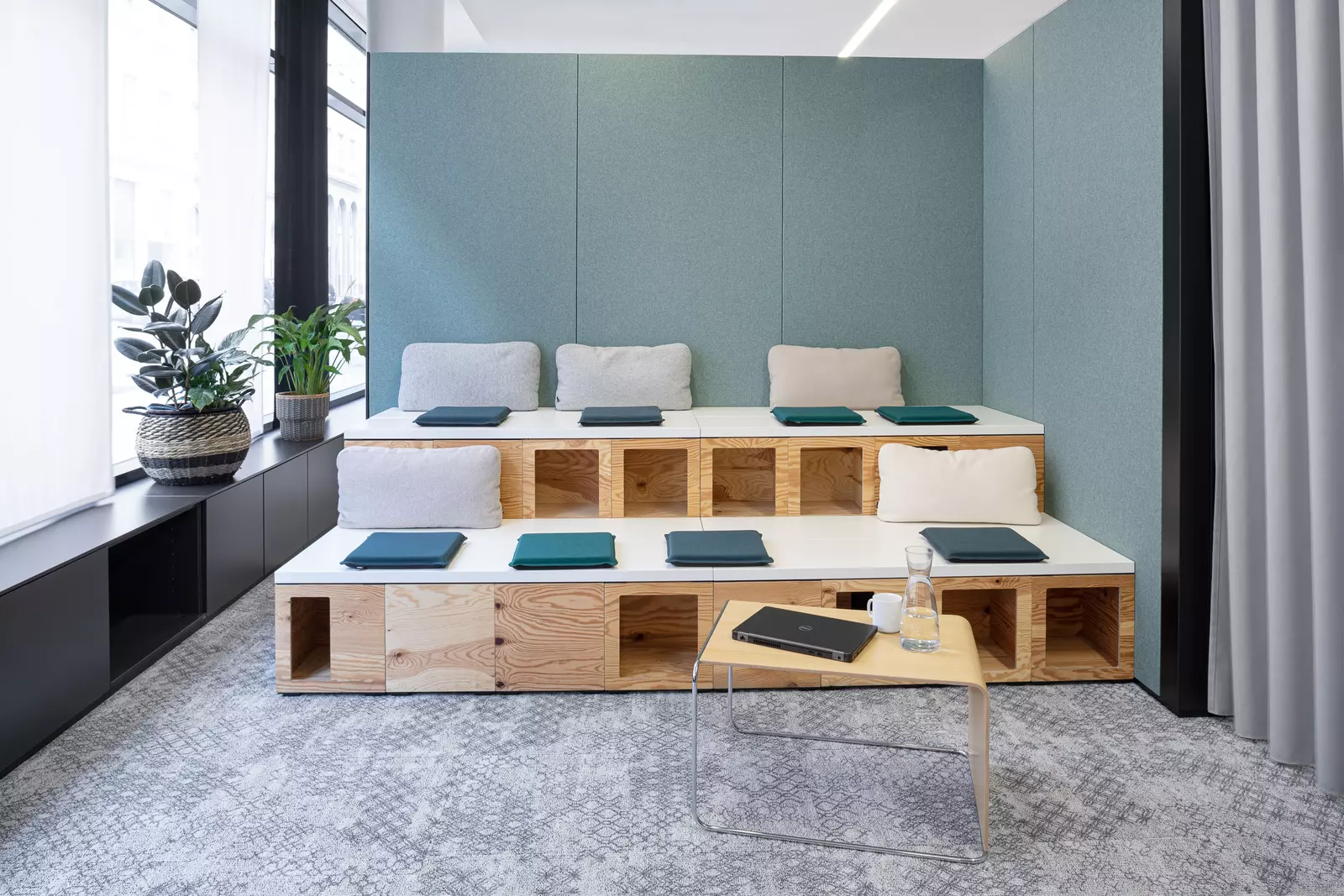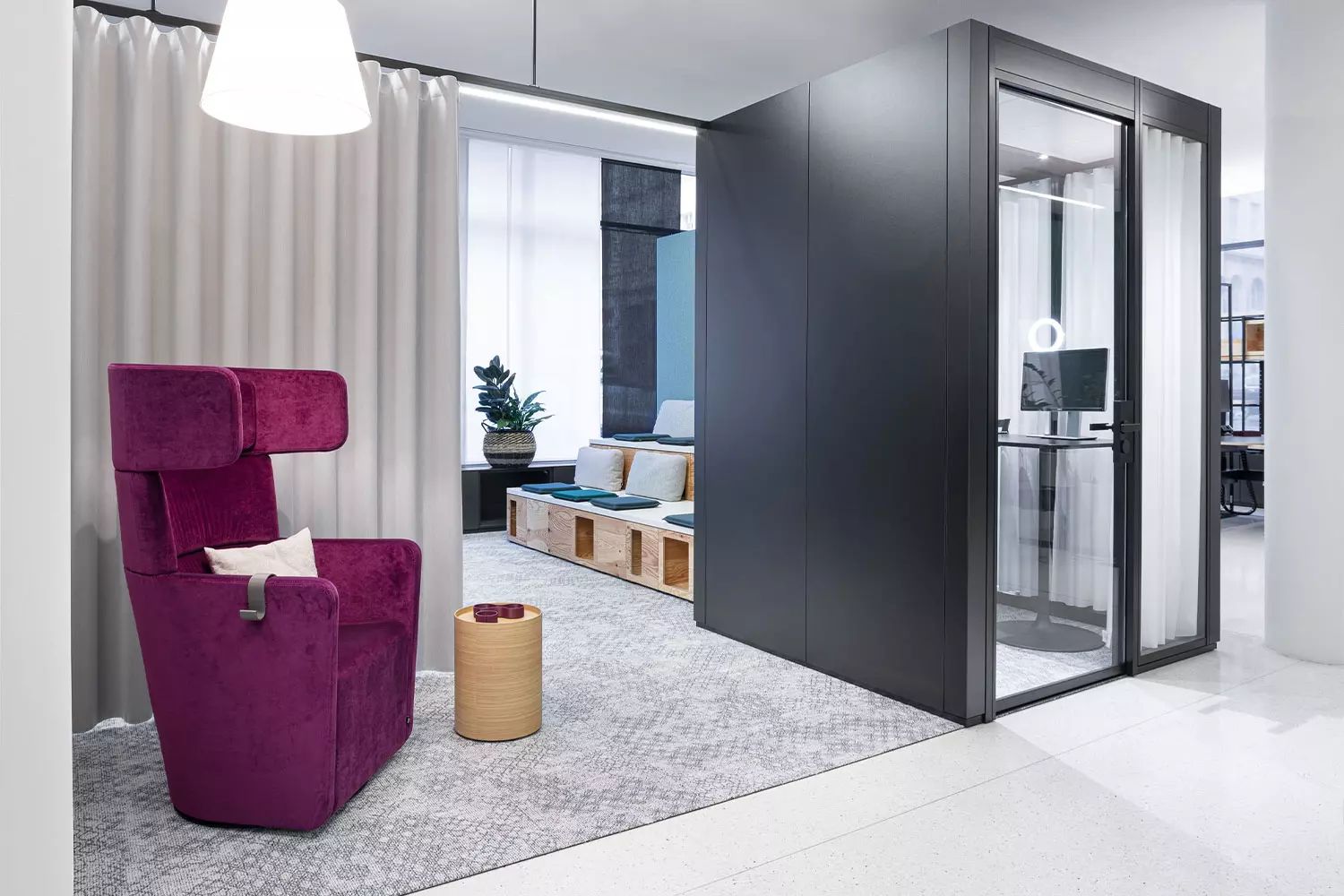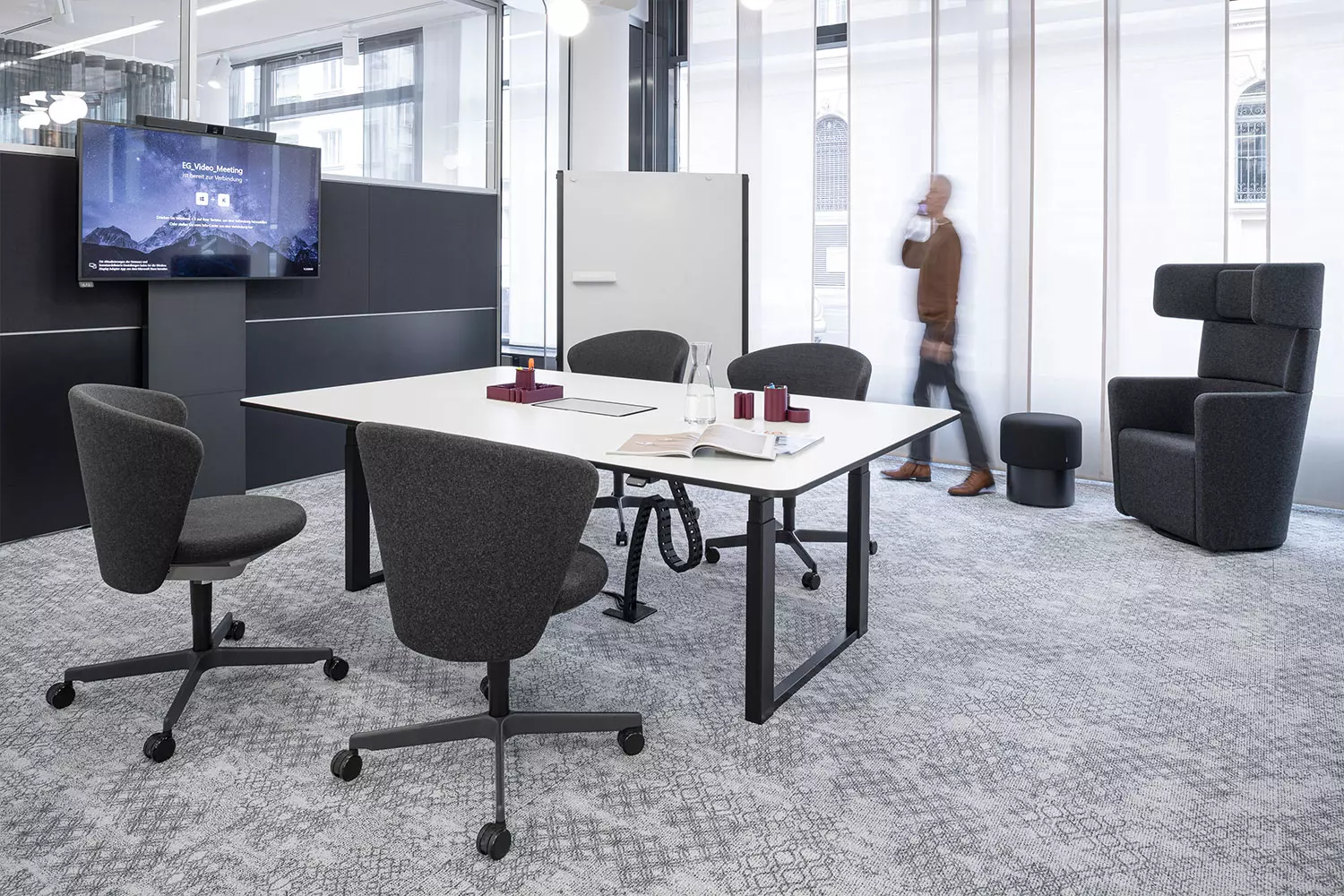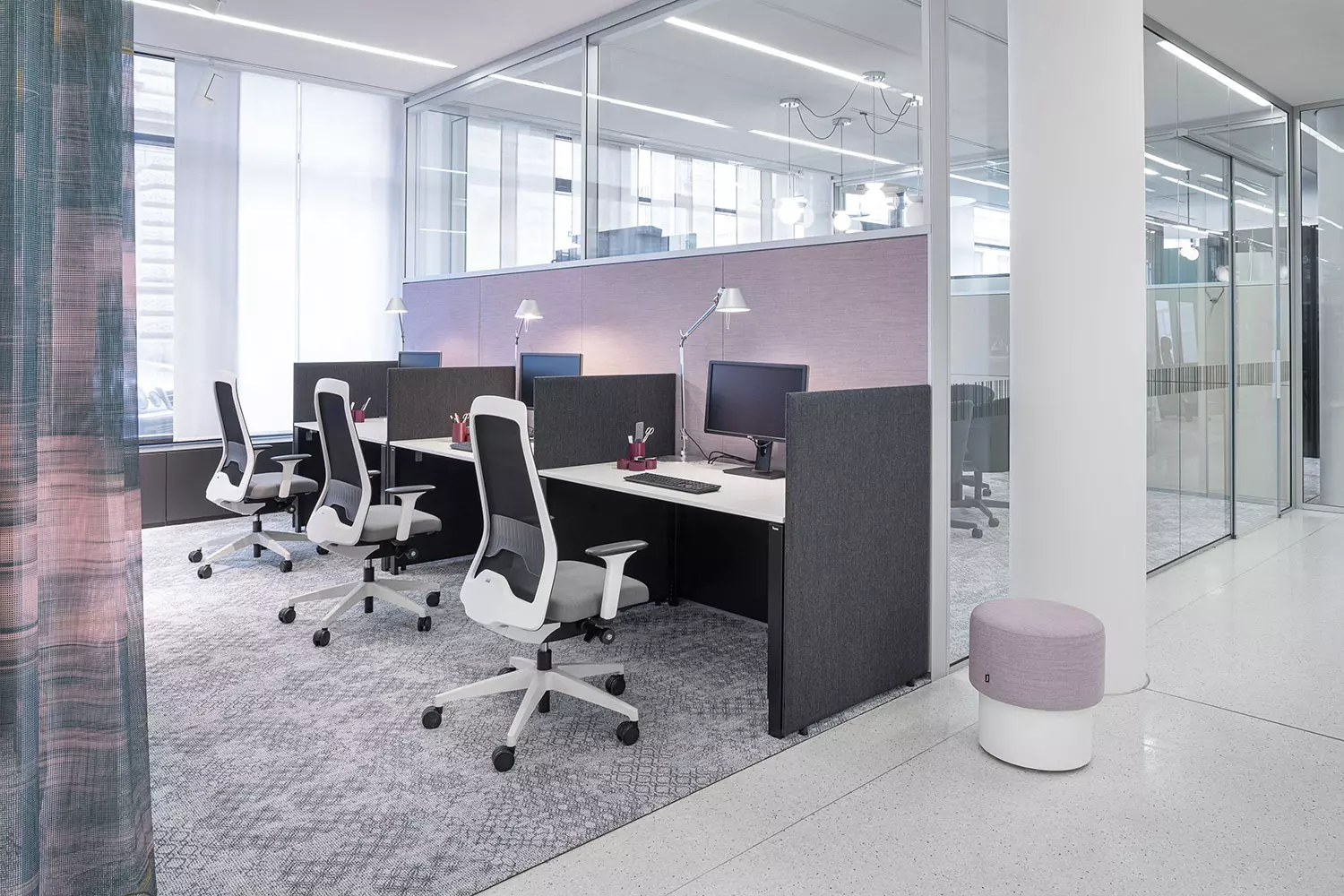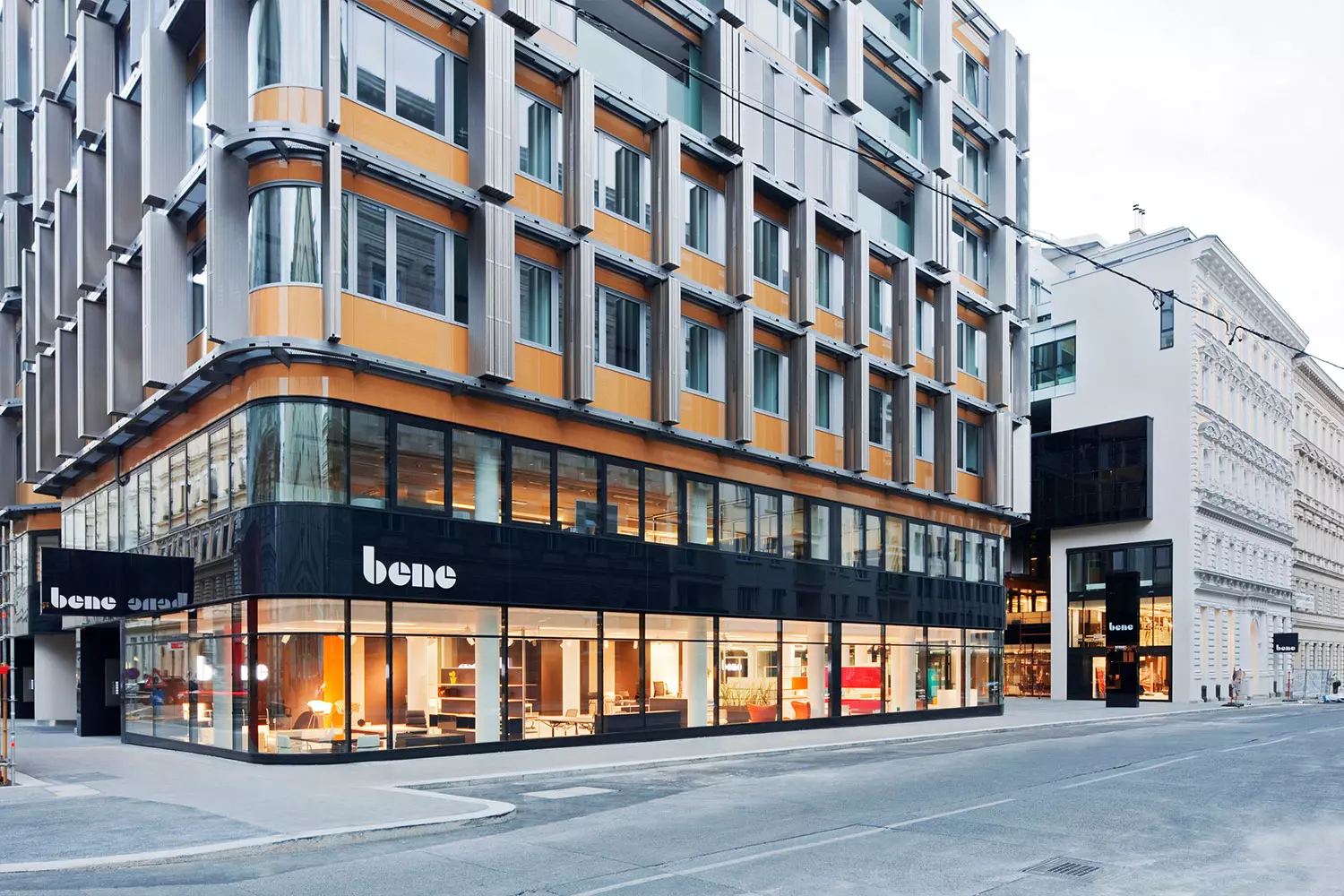WORK NOW: The Bene approach to work
Home offices, remote and hybrid working – over the last few years the way people work has changed dramatically. Bene’s remodelled showroom in Vienna presents the future of work. The renovation was carried out in three phases, allowing the business to continue operating. From the initial concept to planning and starting the work took six months.
On 26 January the showroom at Neutorgasse 4–8 will open its doors once again to reveal an amazingly varied range of products and new inspirational ideas. Over two expansive floors the modern hybrid office in Vienna creates interiors with optimised workspaces for teams and individuals, as well as places that foster a sense of community and social interaction. From meeting zones and individual workspaces to the Workcafé and Bene CASUAL Bistro – smart zoning, elegant furniture and open room architecture are used to transform traditional workstations into attractive living spaces.
Design and choice of colours
Another vital design element is the choice of colours. This defines the mood and atmosphere of different areas: bold colours encourage lively communication and contemplative concentration, while workstations are purposely kept neutral and calm. Here the focus is on optimising function, ergonomics and acoustics. The Bene showroom in Vienna combines modern design and innovative functions to create new inspiration and enable individualised design options. Not just at the level of specific products: comprehensive office design concepts and complete solutions, tailored to the needs of employees, create spaces where people feel at ease and enjoy optimal working conditions.
Sustainability at Bene: Reduce-Reuse-Recycle
Efficient use of materials and resources is a key part of this. In line with the motto “Reduce, Reuse and Recycle”, Bene plays a pioneering role in the field of sustainability. This is practised throughout the company – from product development, procurement, production and logistics to recycling. It includes selecting environmentally compatible materials, such as certified timbers from sustainably managed forests, as well as using recycled materials and increasing the use of renewable raw materials. Bene’s redesigned showroom presents a diverse range of office interiors and invites customers to explore new workplace concepts.
To find out more about the design of the showroom, we interviewed Patricia Möckesch (PM), Head of Innovation and Design, and Hans-Peter Wunsch (HPW), Head of iCOD and Senior Design Architect.
Home office vs office: Is there still demand for company offices?
PM: The office is definitely still alive! But it has changed dramatically and now has competition – from the home office and other options. So it is essential to emphasise the features of office life that cannot be fully recreated online or in other workspaces. Communication and unplanned interactions are clearly amongst the most important. Offices can also offer the right kind of setting for different sorts of tasks, and nurture innovative thinking.
And then the social aspects of office environments should not be underestimated; there are limits to how successfully these can be recreated in digital form, as we have learned from the painful experience of coronavirus. Like restaurants, shops and hotels, it is more vital than ever that offices are attractive and inviting to spend time in. Central to this is design and how it is experienced. That is why today it is also more important than ever to recognise what employees need and to provide the right kinds of spaces. People want a workplace where they feel at ease, which is essential for creative and productive work.
The “one-fits-all” approach of the past is over. In future, offices will need to be flexible, creative, and above all inspiring. Diversity is the key principle. A company’s identity should be felt in its premises, so that people experience it and can identify with it. Offices that achieve this provide an outstanding enhancement of our hybrid working lives.
What trends are reflected in the showroom design?
HPW: Three keywords symbolise the way we think about materials and resources today: Reduce, Reuse and Recycle. This is particularly evident in the latest design trends. Resources are used with great care and products are designed to be as durable as possible, and produced locally. People want to know more about the production process, the manufacturers and the design concept.
How do the new interiors improve wellbeing and communication within a company?
PM: Home offices and remote working have become an integral part of the work ecosystem. So it was important to tailor the layout to the new needs of employees. Wellbeing and communication are priorities. This means that zoning has changed dramatically. It was important to create the right kind of spaces for digital and analogue interactions: places for collaborative work, meetings and encounters. This is evident as soon as you step into the first floor. An open area, the Workcafé CASUAL Bistro, is an inviting place for all employees, partners and customers to spend time in.
How were the colours selected?
HPW: Colours are an important element of design, and define the mood and atmosphere of different areas. We work with classic colour harmonies and also anticipate the colour trends of the next few years. For the Work Now. office on the ground floor we chose a colour scheme of grey, green and white, with accents of purple and golden yellow. The colours reflect the urban setting of the city and its green surroundings.
On the upper floor we used various shades of red, coral and rosé. Yellow and grey blue provide contrasting accents of colour. These strong colours encourage lively communication and contemplative concentration, while workstations are purposely designed to be neutral and calm. Here the focus is on functionality, ergonomics and acoustics.
What trends will influence the future of work?
PM: A key factor is questioning the meaning of work. Thanks to digitalisation, AI and robotics, in future there will be much less need for monotonous and repetitive tasks to be done by humans. Our society will evolve from a growth-based society to a post-growth one, and new values will come to the fore: work will be evaluated in terms of its meaningfulness, scope for personal development and the compatibility of private and professional life. “Meaning” will become increasingly relevant: the most valued product will be the best one, not the newest. Economy, ecology and ethics will go hand in hand.






